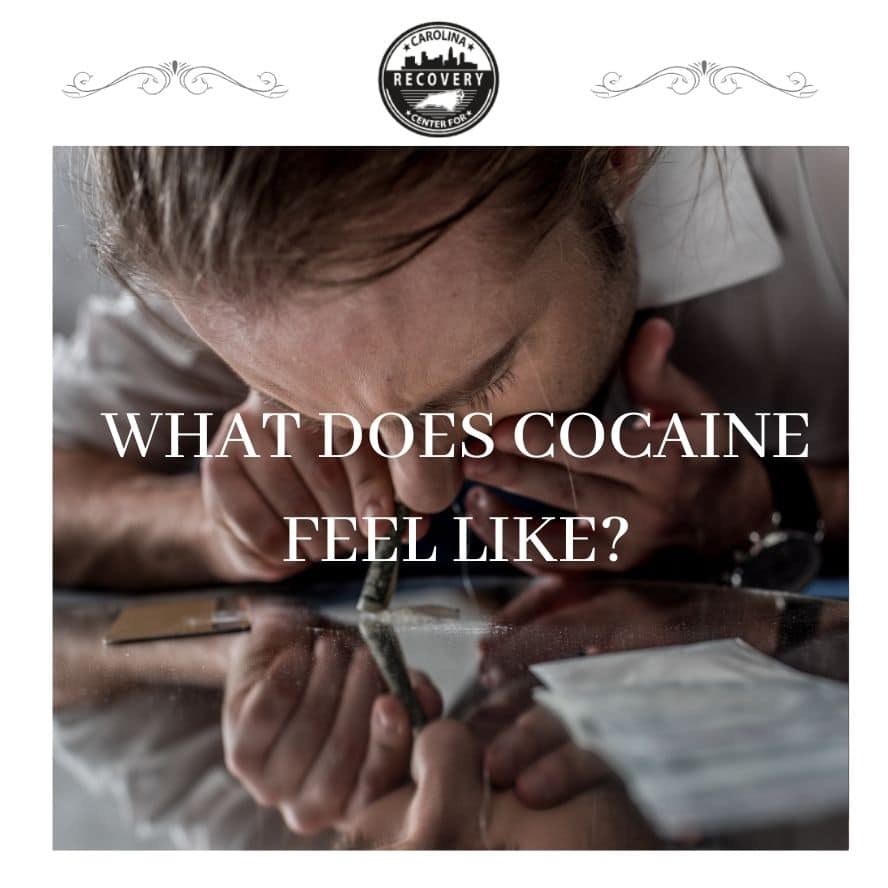What Does Cocaine Feel Like?

Medically Verified: 2/1/24
Medical Reviewer
Chief Editor

All of the information on this page has been reviewed and verified by a certified addiction professional.
Cocaine is a powerful stimulant drug that can lead to addiction after only a few uses. According to the National Institute of Drug Abuse (NIDA), 4.8 million people reported using cocaine in 2021.[1]
When you abuse cocaine, you will experience a rush of euphoria and extreme energy. However, the cocaine high only lasts for a few minutes, so many people binge on it to make the effects last long.
Binging on cocaine can lead to addiction and increase your risk of overdosing. If your loved one abuses cocaine, you might wonder what it feels like.
What Do the Effects of Cocaine Feel Like?
Upon abusing cocaine, a rush of energy and euphoria will take over. The excitement and increased energy cause people to want to use cocaine repeatedly in short periods.
In addition to euphoria and energy, cocaine causes physiological effects like constricted blood vessels, dilated pupils, increased body temperature, fast heart rate, and heightened blood pressure.[2] Unfortunately, because most people binge on cocaine, these effects can become dangerous as a person uses more and more of it.
When someone uses large amounts of cocaine, they might experience adverse effects as well. Some people become aggressive, violent, or impulsive, increasing their risk of engaging in dangerous behaviors while high. Additionally, many individuals experience muscle twitching, tremors, and anxiety that leads to panic attacks.
Side effects of cocaine include:
- Increased heart rate
- High blood pressure
- Dilated pupils
- Agitation
- Anxiety
- Paranoia
- Insomnia
- Decreased appetite
- Nausea
- Nosebleeds
- Nasal congestion
- Hoarseness
- Chest pain
- Heart arrhythmias
- Seizures
- Stroke
- Headaches
- Tremors
- Muscle twitches
- Sweating
- Hallucinations
- Delusions
- Impaired judgment
How Long Does a Cocaine High Last?
The way that you use cocaine affects how long the high will last. People might smoke, snort, inject, or consume cocaine orally. However, cocaine usually does not last very long no matter how you use it.
The length of time you will be high on cocaine depends on the method of administration:
- Snorting – the high will begin within minutes and last 45 to 90 minutes
- Smoking – the effects will begin within seconds and last 15 to 20 minutes
- Injecting – the high will begin almost instantaneously and last 15 to 20 minutes
- Oral Use – the high will take a few minutes to begin and last up to 90 minutes
Cocaine only lasts up to 90 minutes no matter how it is used, so many people continuously abuse it throughout one night of partying. When someone misuses a drug over and over again in a short period, this is known as binging. Binging on cocaine increases the likelihood of addiction and life-threatening overdoses.
What is a Cocaine Crash?
Cocaine does not last very long, and people will experience a crash once the effects begin to wear off. This crash is the main reason that people get stuck in a cycle of addiction, as the effects can be difficult to cope with, causing them to abuse more cocaine.
The comedown people experience after being high on cocaine is called a crash. The common symptoms of a cocaine crash include:
- Agitation
- Irritability and restlessness
- Increased blood pressure and body temperature
- Intense cravings for cocaine
- Mood swings
- Exhaustion
- Symptoms of depression
- Suicidal thoughts
- Increased appetite
If you notice that your loved one goes from being very excited, happy, and talkative, to down, tired, and moody in a short time, they could be experiencing a cocaine crash. Cocaine crashes do not necessarily mean they are addicted, however, the symptoms of cocaine withdrawal are very similar. When someone experiences cocaine withdrawal, they require professional medical detox services.
Can You Overdose on Cocaine?
Overdoses occur when someone takes too much of a drug for their body to handle, causing their system to shut down in one way or another. It is possible to overdose on cocaine.
The symptoms of a cocaine overdose include:[3]
- Hyperthermia
- Increased blood pressure and heart rate
- Changes in respiration
- Chest pain and heart attacks
- Nausea and vomiting
- Tremors or shaking
- Anxiety and panic attacks
- Paranoia and hallucinations
- Delirium
- Seizures and strokes
Cocaine overdose can lead to death without prompt medical intervention. As a result, you should always contact emergency medical services if you believe a loved one is overdosing on cocaine. After they receive medical treatment for their overdose, they should be transferred into a drug addiction treatment program so they can learn how to maintain long-term sobriety from cocaine.
Finding Help for Cocaine Abuse and Addiction
If you or a loved one are addicted to cocaine, it’s time to seek help. Cocaine addiction can be very difficult to overcome, making it hard to function in your daily life. Thankfully, drug rehab programs like the Carolina Center for Recovery can provide you with the tools and support you need to achieve lifelong sobriety.
To learn more about our cocaine addiction treatment program, contact us today.
References:
- The National Institute of Drug Abuse (NIDA): What is the scope of cocaine use in the United States, Retrieved October 2023 From https://nida.nih.gov/publications/research-reports/cocaine/what-scope-cocaine-use-in-united-states
- The National Institute of Drug Abuse (NIDA): What are the short-term effects of cocaine use, Retrieved October 2023 From https://nida.nih.gov/publications/research-reports/cocaine/what-are-short-term-effects-cocaine-use
- The National Library of Medicine (NLM): Cocaine Toxicity, Retrieved October 2023 From https://www.ncbi.nlm.nih.gov/books/NBK430976/

